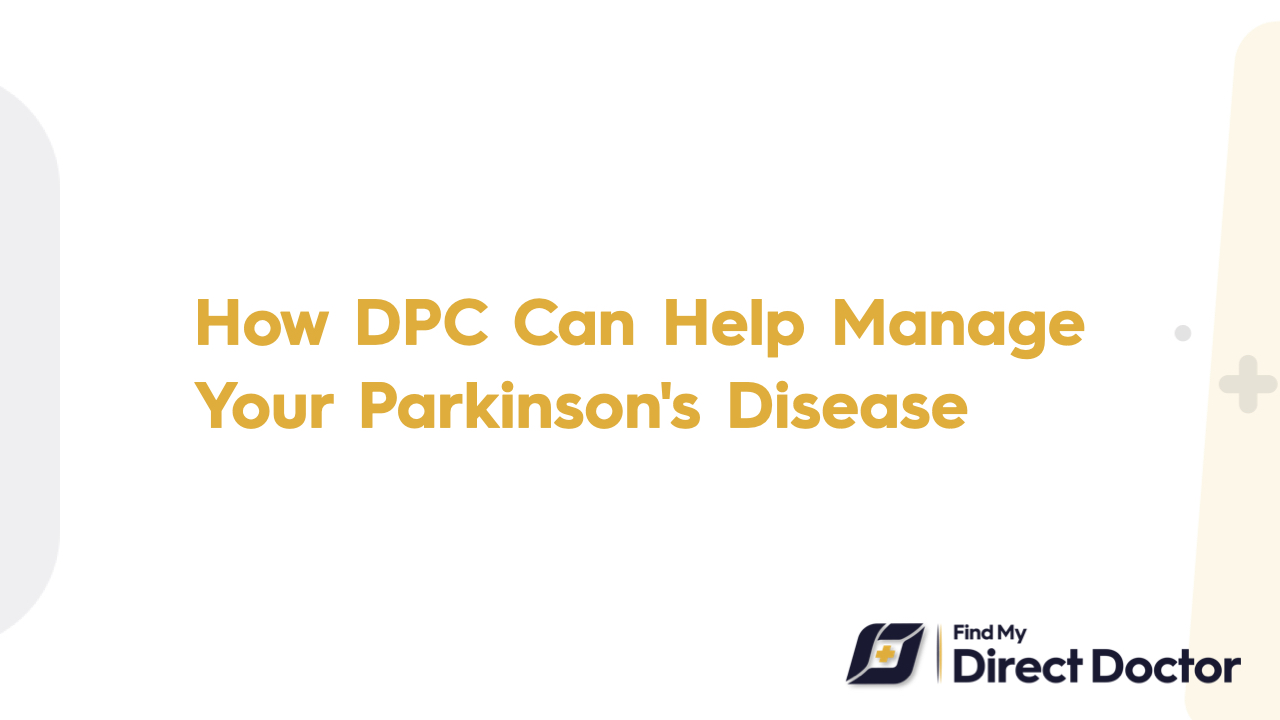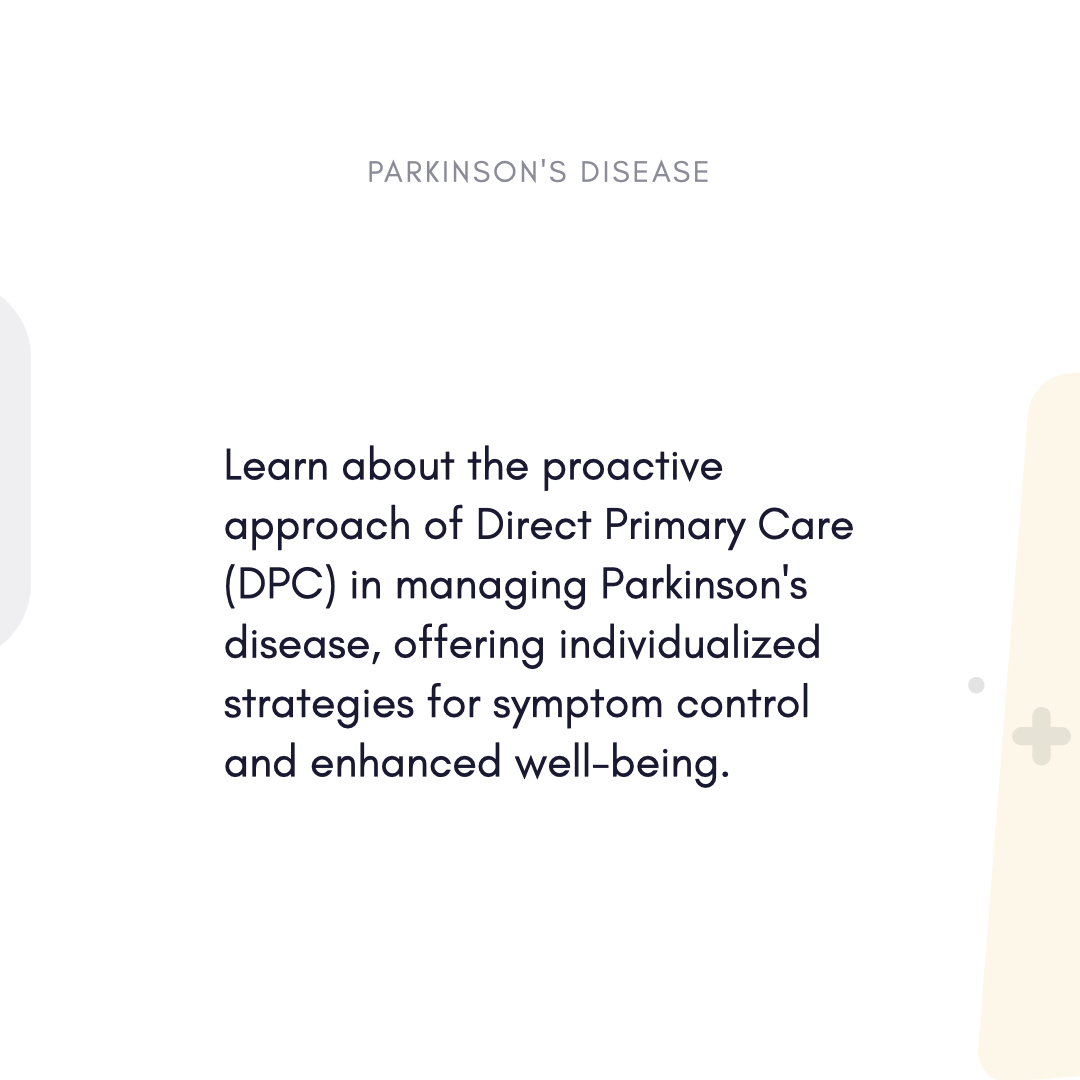Parkinson’s Disease and Direct Primary Care (DPC): Personalized Care for Enhanced Quality of Life
A vibration that throws off daily responsibilities. A voice growing softer every day. For almost a million Americans with Parkinson's Disease (PD), these challenges are exacerbated by hurried visits, disjointed therapy, and the quiet development of non-motor symptoms. Though conventional medicine lags behind, there is hope: Direct Primary Care (DPC) presents a proactive, patient-centered alliance to exactly and compassionately negotiate PD.

Dealing with Parkinson's Disease: Understanding
The neurodegenerative disease The loss of dopamine-producing neurons that characterizes Parkinson's disease produces:
- Among motor symptoms are bradykinesia—slow movement, postural instability, and tremor and rigidity.
- Among non-motor symptoms are depression, insomnia, cognitive decline, orthostatic hypotension.
- Progressive quality: With time, symptoms worsen; dynamic changes in treatment are therefore required.
The American College of Physicians stresses the need of continuous, coordinated treatment to manage the complexity of PD and improve long-term outcomes.
DPC Changing Parkinson's Management
Typically costing 50–150 USD/month, Direct Primary Care (DPC) offers unlimited access to your doctor for a set price. This translates for PD patients into no insurance delays, no co-pays, and a care plan catered to your symptoms.
1. Proactive, Continuous Watching
DPC's open methodology ensures:
- Regular corrections: Reducing "off" times requires maximising carbidopa/levodopa dosages.
- Early intervention: Track non-motor issues such mood swings or constipation before they get more severe.
- Affordable diagnostics: Bargained for DaTscans' cash prices or bloodwork to rule out mimics like essential tremor.
2. Individualized, Guideline-Driven Treatment
Customized programs compliant with neurology best standards are designed by DPC physicians:
- Managing medications means juggling anticholinergics, MAO-B inhibitors, or dopamine agonists.
- SSRIs treat depression; fludrocortisone helps control orthostatic hypotension.
- Discount referrals to physical therapists or speech-language pathologists for gait training are part of allied health coordination.
3. Complete, Reasonably Cost-Effective Help
DPC reduces emotional as well as financial load by:
- Reducing drug expenses: Wholesale pricing for generics like ropinirole or amantadine.
- 24/7 reach: rapid direction for problems with side effects from drugs or dysphagia.
- Carer tools: teaching homes safety precautions or symptom tracking methods.
DPC's Benefits for Parkinson's Individuals
1. Unlike Accessibility
- Appointments for sudden flare-ups of symptoms same-day or next-day.
- For immediate needs including confusion or falls, call or text directly.
2. Individualized Action Plans of Approach
- Control of motor symptoms: customizing deep brain stimulation (DBS) or apomorphine pump referrals.
- Programs like boxing or tai chi help to slow down lifestyle change.
3. Reasonable and Open Cost
- Typical savings ranging from 2,000+ USD yearly from avoiding ER visits, specialist co-pays, and imaging mark-ups.
- Membership includes management of chronic diseases, care coordination, and consultations.
Individual Stories of Personal Success from Actual Experience
- John, 68, struggled with horrible "freezing" episodes. His DPC doctor advised Nordic walking sessions, changed his levodopa schedule, and connected him with a neurologist for DBS evaluation. These days he gardens and walks his dog without thinking twice.
- Maria, 72, became quite depressed after her diagnosis. Her DPC provider wrote sertraline prescriptions, set up art therapy, and taught mindfulness skills. Her attitude changed, and she founded a local PD support group.
Often Asked Questions: Parkinson's Disease and DPC: Can DPC Control Advanced PD Including Dementia?
- A: Sure. DPC doctors work with neurologists, link families with memory care resources, adjust medications for cognitive problems.
- For long-term PD treatment, DPC seems logical.
- A: Certainly. Members save on drugs and therapy co-pays by means of proactive care, so avoiding costly hospitalizations.
- Should I call a specialist in movement disorders?
- A: Working with top neurologists, a DPC physician sets up quick visits and self-pay discounts.
Why DPC Gives Parkinson's Patients a Win?
Emphasizing their alignment with top PD recommendations, the American Academy of Family Physicians supports DPC.
- Treatments should be tailored to fit individual progress and symptom profiles.
- Tools for monitoring motor fluctuations, diet control, and support of adaptive devices empower us.
- Trust: One consistent care team is replacing scattered, impersonal visits.
Reversal of Control Over Your Parkinson's Course
Parkinson's is a progressive condition, thus your care shouldn't be passive. DPC helps you to live completely, every day, find a partner who responds fast and pays close attention.






